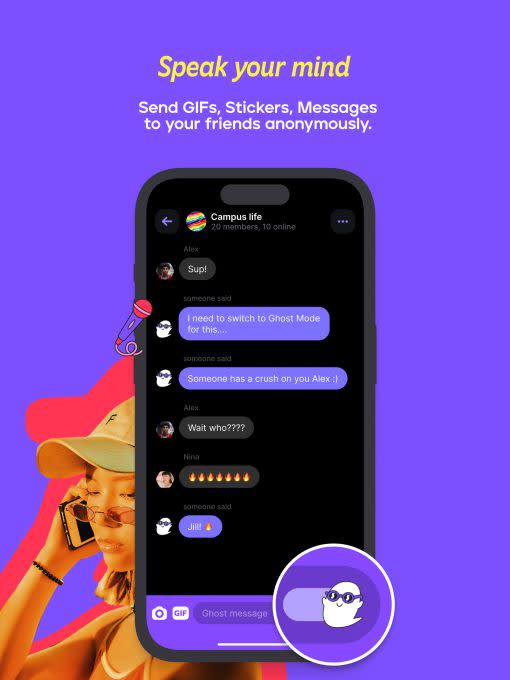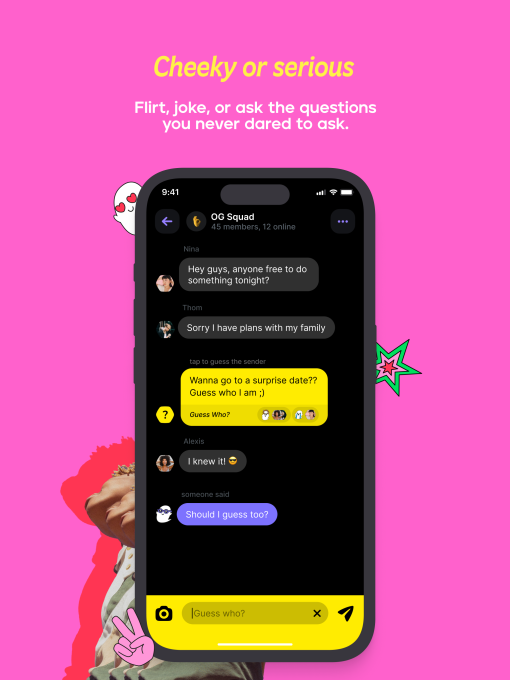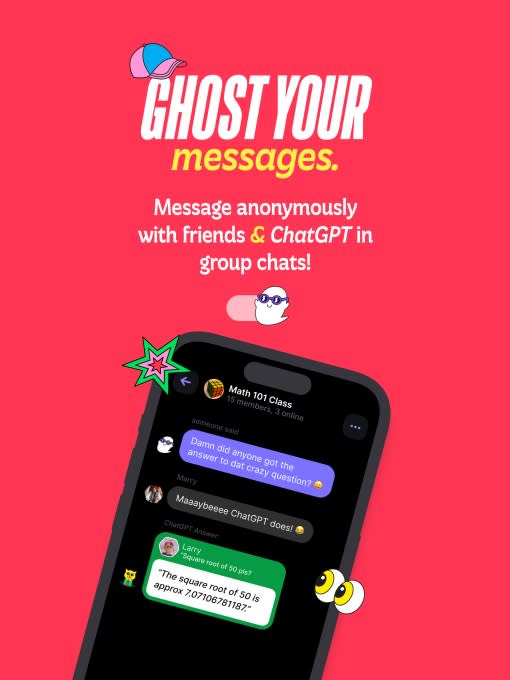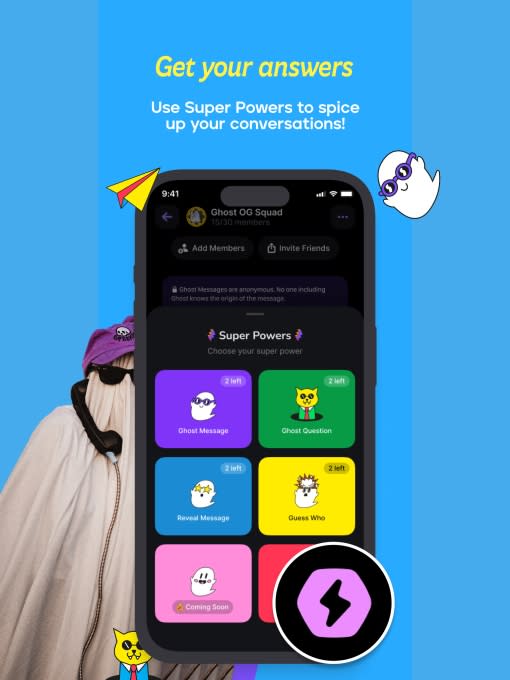Ghost's new anonymous group messaging app has ChatGPT baked in
Anonymous social apps have a history of devolving into bullying and harassment, ultimately leading to their failure. But a new startup called Ghost believes that putting in extra guardrails around the anonymous experience will allow users to have fun, without the usual downsides. To test this theory, the company has now launched its Ghost messaging app that allows users to share an anonymous message in a group chat with friends in order to flirt, joke or ask questions without revealing their identity. The app also includes a range of other features, including the ability to ask ChatGPT a question directly within the group chat, among other things.
The idea, explains Ghost's founder Cem Kozinoglu, was to make something that was fun to use but that still respected a user's desire for privacy. To accomplish this, the app uses something it's calling "Ghost Protocol," which is a system that utilizes zero-knowledge proofs on the end user's device.
This way, the app knows who has access to a given group chat, but Ghost -- the company itself -- does not.
Thanks to his entrepreneurship background, Kozinoglu understands the motivations of social app users. Prior to Ghost, the founder worked as the director of Mobile at GIPHY after the company acquired his Techstars-backed startup /Slash Keyboard. He's seen the latest trends among teen apps, but believes there's potential to do anonymous social in a way that's safer without enabling bad behavior.
"We started playing around with this concept, and it also fit very well with the name 'ghost' because of anonymity," Kozinoglu explains. "But we also know there's a dark side of anonymity. [There are] these apps coming out -- Gas [which was acquired by Discord], Slay -- and they're purely focusing on cutting the chat and giving positive feedback to your peers...what we're doing is kind of like 'Gas meets Discord.' We want to add different flavors of anonymous messages," Kozinoglu says.
For example, one type of anonymous message Ghost enables is anonymous crushes. A user could say to the group they have a crush on someone without the sender revealing their name. Then, if the other person also has a crush on them, too, they would be able to have a private chat, similar to Tinder.

Image Credits: Ghost
In a group chat for a classroom at school, anonymity could allow students to ask questions among peers who may or may not be close friends.
There are also hidden messages which let users see who cares most about them, as the sender gets alerted as to who revealed the message.
"Guess Who" messages, meanwhile, initially hide the sender, allowing users to guess who sent the message.

Image Credits: Ghost
Not all these types of anonymous messages are live as of yet, but Kozinoglu says the Anon Crushes feature should be ready to ship by next week.
To add protections around anonymity, Ghost uses a moderation system that automatically deletes any Ghost message (anonymous message) if at least two people report it. If the same bad actor then sends two ghost messages that get reported, the app will block their anonymous identity in that particular group chat. That is, the app doesn't block the user themselves from the group chat, only their ability to post anonymously to the group. (In fact, the app itself doesn't even know which user to block because of its use of the Ghost protocol. It only knows which anonymous identity to restrict.)
Finally, if the bad actor gets reported across three different groups, resulting in bans of their anonymous identity, they're no longer able to use "ghost mode" in any group chat.
The Ghost branding appears alongside other features, as well, like the ability to be online but invisible, which is called Ghost Status.

Image Credits: Ghost
Its group chats are limited to 50 users so they don't get overly large, as on Telegram. The idea is that users should actually know one another in some way. This is also enforced by requiring users to allow the app to access their contacts -- and there's no way to skip this permission request, we found.
Another fun and timely feature is the ability to use ChatGPT (the ChatGPT-3.5-turbo model) from within the group chat, which allows users to ask the chatbot questions and interact with the bot as a group.
"It is one of the first [use cases of] multi-player ChatGPT inside a group chat, Kozinoglu said in a follow-up email. "It is fully context-aware. It has been one of the most used features," he added.

Image Credits: Ghost
Kozinoglu says the goal is to not replace other messaging apps, necessarily, but to become known for the format it's introducing.
"In Snapchat's case, they owned disappearing messages," he notes. "In our case, we want to own anonymous messages -- any flavors of anonymous messages -- and be an alternative place where it's fun. It's fun to be anonymous. It's fun to be able to talk to others and allow you to do pure freedom of speech," Kozinoglu says. The latter is particularly important to the Turkish founder, who knows firsthand the difficulties around being able to express yourself under a government rule that cracks down on free speech.
The company behind Ghost, Catch Social, was actually founded three years ago but had originally been developing a different product focused on adding chat to a crypto wallet-to-wallet application. A prior co-founder, also from GIPHY, had worked on that project but left the startup around six months ago. There are now nine employees, including two contractors.
To date, Ghost has raised $8 million across two seed funding rounds from investors including Slow VC, Coinfund, General Catalyst, Betaworks, DreamMachine, Afore VC, 186 VC, D4 and various angels like GIPHY founder Alex Chung, Wayne Chang, Jeff Siebert and others.
Some of that money is being spent now on customer acquisition -- Ghost is doing a lot of TikTok marketing. But Kozinoglu says they've gotten Ghost's customer acquisition costs down to 15 cents per install and are now focusing more on working influencers, not just running ads.
With the increased demand for ChatGPT following the launch of GPT-4 and news from Microsoft around Bing, Ghost is focusing more heavily on its own ChatGPT features, which it's calling "Ghost Question." The startup is waiting on ChatGPT 4 access, Kozinoglu notes.
The app had a waitlist of over 50,000 sign-ups pre-launch. Ghost has since attracted 30,000 installs following last week's public launch and is now hovering around No. 50 in the U.S. App Store's Social Networking category.

 Yahoo Autos
Yahoo Autos 